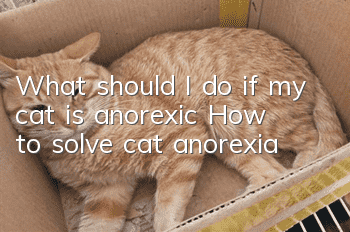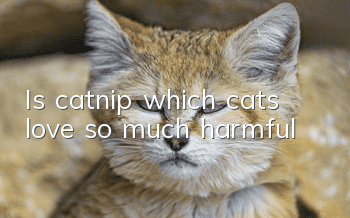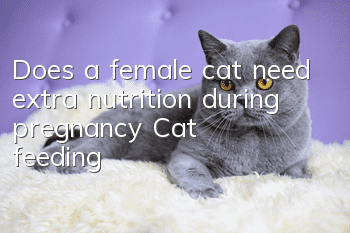What should I do if my cat is anorexic? How to solve cat anorexia?

Anorexia is a loss of appetite and reduced food intake due to loss of appetite. Anorexia in cats is not a disease in itself, but a symptom that indicates something else is wrong with the cat. Possible causes include stress, hair loss, and even serious illness. Below, we’ll cover some of the most common causes of anorexia in cats and how to help your cat overcome anorexia.
What is anorexia in cats?
If a cat simply eats less, this is anorexia or loss of appetite. But "anorexia" is often used to describe reduced food intake or a complete lack of food intake.
In addition, anorexia can be further divided into "true anorexia" and "false anorexia". True anorexia is a loss of appetite, while pseudo-anorexia occurs when a cat wants to eat but finds it difficult to eat. For example, if there is a problem with the teeth, it cannot chew the food adequately.
Symptoms of anorexia in cats
Because anorexia means a loss of appetite, anorexic cats will eat less than usual or stop eating altogether. Anorexia may be accompanied by other signs, including:
Vomiting or diarrhea.
Hide or change emotions/personality.
Lethargy or decreased energy.
Lose weight.
Drop things while eating.
Dooling.
Jaundice.
Increased thirst and urination.
While these symptoms often accompany a loss of appetite, they are certainly not the only possible symptoms. Regardless of other symptoms, whenever you notice a change in your cat's appetite, you should talk to your veterinarian or schedule an appointment.
Causes of anorexia in cats
There are many possible causes of anorexia in cats. Here are some fairly common reasons:
Anything that causes an upset stomach.
Side effects of certain medications.
Picky eating habits.
Stress, such as changes at home, moving to a new home, boarding or traveling.
Intestinal parasites.
Infections, especially upper respiratory tract infections, affect a cat's ability to smell food.
Pain caused by injury, arthritis, etc.
Digestive problems such as IBD.
Pancreatitis.
Dental disease or tooth pain.
Underlying health conditions such as kidney disease, neurological disease, cancer, asthma, heart disease, etc.
Some health conditions are more or less severe depending on the cat's age, medical history and symptoms. In order to clarify the problem so that anorexia can be effectively treated, your veterinarian will often recommend diagnostic testing. To determine the cause of anorexia, your veterinarian will use all available information, including your cat's medical history and symptoms. While waiting for your vet appointment, try to observe and gather information. For example, pay attention to how long the anorexia lasts, whether the cat is still eating small amounts, etc.
Often, diagnostic tests are needed to provide more information and reach a diagnosis. This may include:
Stool test to check for parasites.
Blood tests evaluate organ function, blood sugar, electrolyte balance, and (if necessary) hormone tests, infectious disease tests, or other blood tests.
Urinalysis.
Blood pressure.
Use X-rays or ultrasound to take a closer look at your cat's digestive tract.
Endoscopy or biopsy.
Prognosis of a cat that won’t eat
For example, an otherwise healthy cat with parasites can be completely cured and can be eaten again with only simple parasite treatment. On the other hand, a cat with a loss of appetite due to cancer may have a much poorer prognosis for returning to normal health and eating habits. So the most important thing is to figure out why the cat isn't eating. This information will determine prognosis and treatment. Anorexia can pose risks or complicate underlying health problems, and regardless of the cause, long-term or severe anorexia can lead to complications that lead to a worse prognosis.
A common condition is for a cat to develop hepatic fat or fatty liver disease. This occurs when a cat doesn't eat and the liver is overwhelmed by the need to quickly convert stored fat in the body into energy, which can lead to liver failure. Treatment usually takes several weeks, and the condition can be fatal. Fatty liver develops surprisingly quickly, especially in overweight cats who may get the condition after just a few days of not eating. Good nutrition is also important for supporting healthy immune system function and helping a cat recover from any illness that causes anorexia. So it's important to get a cat eating as quickly as possible.
How to treat anorexia in cats
Treatment focuses on the underlying cause and varies greatly based on the cat's needs. Additionally, regardless of the underlying cause, supportive care should be implemented until the cat's appetite is restored to prevent complications and the risk of fatty liver disease. Here are some of the most common supportive care measures to help anorexic cats:
Antiemetics.
Painkillers.
AntiInflammatory medicine.
Appetite stimulant.
Fluid and electrolyte support.
Tempting foods to encourage appetite, such as canned foods with strong smells.
Measures to minimize stress. Feed your cat in a quiet area of your home, preferably away from other pets that may compete for food.
Heat food before giving it to your cat. Just check to see if the food is too hot, especially when using a microwave, which can create heat pockets.
Force feed or syringe feed the cat. This method may work if the cat accepts food this way, or only needs nutritional support for a short period of time. However, if a cat refuses to be force-fed, this approach can lead to food aversion and worsen anorexia.
Hospitalization and placement of feeding tubes if needed. This may sound scary, but for cats who require long-term nutritional support, feeding tubes are actually more comfortable and less stressful than force-feeding.
Some of these measures can be tried at home, but others must be used under the guidance of a veterinarian.
Conclusion
Anorexia, or loss of appetite, has many possible causes in cats ranging from stress to minor medical conditions to serious or life-threatening medical conditions. Anytime you notice a change in appetite, it's best to schedule a veterinary consultation for appropriate treatment as early as possible.
- How to make a cat smart and obedient
- What should I do if my cat eats oil?
- Ways for cats to live in harmony with their owners, cat training!
- How long does a blue cat live?
- What are the functions of cat meat pads? Five major functions of cat meat pads
- Why is the cat twitching? It may be due to lack of trace elements
- Why does the cat keep meowing when it comes to a new environment?
- How to treat black cinders on cat’s balls
- What is better for Burmese cats to eat?
- What does Scokoko look like?



